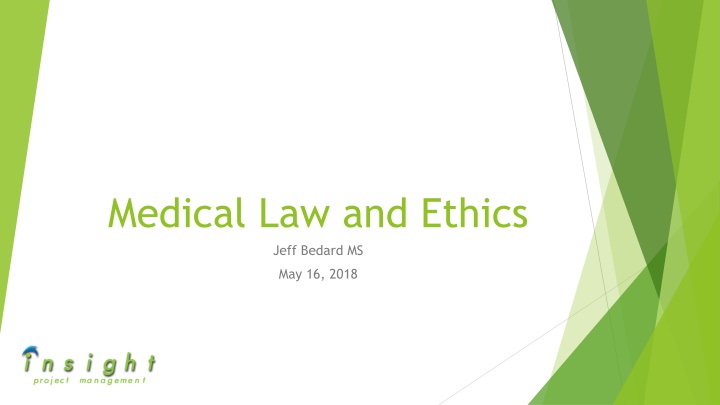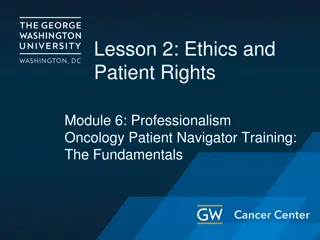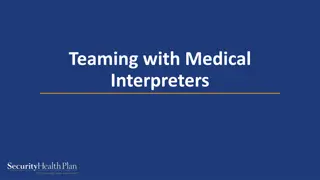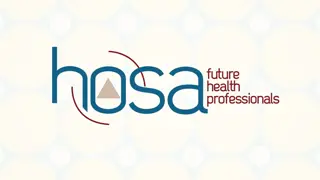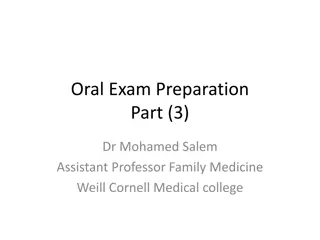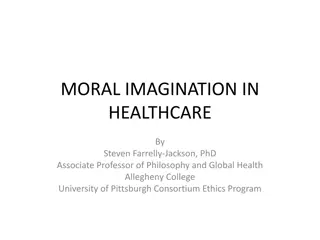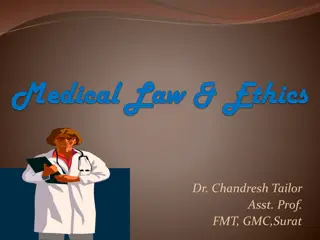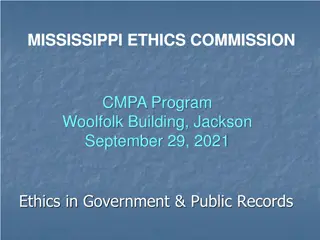Medical Law and Ethics in the Healthcare Industry
Delve into the intricate world of medical law and ethics with insights on the distinctions between laws and ethics, the significance of HIPAA regulations, and real-world examples of breaches of patient privacy. Explore the implications of non-compliance and the importance of maintaining confidentiality in the healthcare sector.
Download Presentation

Please find below an Image/Link to download the presentation.
The content on the website is provided AS IS for your information and personal use only. It may not be sold, licensed, or shared on other websites without obtaining consent from the author.If you encounter any issues during the download, it is possible that the publisher has removed the file from their server.
You are allowed to download the files provided on this website for personal or commercial use, subject to the condition that they are used lawfully. All files are the property of their respective owners.
The content on the website is provided AS IS for your information and personal use only. It may not be sold, licensed, or shared on other websites without obtaining consent from the author.
E N D
Presentation Transcript
Medical Law and Ethics Jeff Bedard MS May 16, 2018
Introduction A little about me: Over 20 years in the medical device and pharmaceutical industries Started as a medical device representative-in surgery every day M-F and then moved into the pharmaceutical industry Currently own my own company and work with pharmaceutical logistics providers to implement new client programs What I do-project management, account management and quality assurance. I work with Operations, Customer Service, Quality Assurance, Compliance/Regulatory and Information Technology What I love-every day is different
Law vs. Ethics Laws are a rule of conduct or action prescribed or formally recognized as binding or enforced by a controlling authority. Laws have penalties for disobedience-fines or prison Ethics are concerned with standards of behavior and the concept of right and wrong, over and above what is legal in a given situation. Moral values are formed through the influence of family, culture and society & serve as the basis for ethical conduct. From Law and Ethics from Medical Careers, Karen Judson, Carlene Harrison and Sharon Hicks 4thed. 2010
Medical Law HIPAA-Health Insurance Portability and Accountability Act of 1996. What does it mean? It contains 4 sets of standards: Transactions and Code Sets (for simplified billing), Privacy Rule (release form-Notice of Privacy Practices), Security Rule (transmission of PHI) and National Identifier Standards Defines covered entities & transactions What is PHI? Protected Health Information is information that contains 1 or more unique patient identifiers. Examples: name, zip code, date of birth, telephone number, email, Social Security Number, etc.
Medical Law, cont. There are 11 HIPAA defined permissions/reasons for the disclosure of PHI. Can you think of what some of those might be? Special requirements for disclosing PHI: 1. Verification: Either the patient or the request must be verified. 2. Minimum amount of information necessary 3. Marketing-pharmaceutical or medical device companies 4. Psychotherapy notes Penalty per violation: $100-$50,000 per violation. Max $1.5MM
Medical Law, cont. Breaches of privacy/confidentiality A 2008- 120 employees of the UCLA medical Center in Los Angeles had viewed the electronic health records of celebrities without authorization between 2004 and 2006. The crackdown during that time led to numerous warnings, employment terminations, and hefty fines. 2011, the UCLA Health System agreed to pay $865,500 as part of a settlement with federal regulators after two celebrity patients alleged hospital employees broke the law and reviewed their medical records without authorization. Victims of this unauthorized release of medical records include Michael Jackson, Whitney Houston, Britney Spears, Farrah Fawcett and former California First Lady Maria Shriver.
Medical Law, cont. Social media in healthcare settings Facilities ban any discussion of patients/patient conditions on social media Some facilities block all access to social media from their network Focus is on education and awareness, not policing their employees social media use
Medical Law, cont. Standard of Care-what is it & why does it matter? Standard of Care is defined as the accepted level of performance expected of a healthcare provider in carrying out their responsibilities. Failure to meet the standard of care is one of the most common reasons cited for malpractice lawsuits. Proficiency is paramount, which is why healthcare providers are required to pursue continuing medical education (CME s) in order to maintain their license. Closely related is Duty of Care-defined as the obligation of healthcare providers to patients and nonpatients.
Bioethics What is it? It deals with the ethical implications of medical treatment & research and biological research on patients and animals. Ethical frameworks: in addition to personal moral/value systems, healthcare professionals also rely on a code of ethics. Some examples: American Medical Association Principles of Medical Ethics https://www.ama- assn.org/sites/default/files/media-browser/principles-of- medical-ethics.pdf American Nurses Association Code of Ethics: https://www.nursingworld.org/coe-view-only
Bioethics, cont. Ethics committees-assist healthcare providers and institutions in making ethical decisions around a difficult cases. http://www.pantagraph.com/lifestyles/health-med-fit/ethics- committees-help-with-life-death-decisions/article_18ce6a4e- fad1-11e2-bfa8-0019bb2963f4.html One of the tools that assist bioethicists in making decisions is called the 4 Box Analysis It contains a list of questions that should be addressed in order to assist in making the best decision for that patient.
Bioethics-case study A forty-five-year-old man with a three-year history of cardiovascular disease has entered the hospital with a stroke that has paralyzed his right side and caused him to aspirate food of any consistency. His mental status is clouded and there is disagreement as to whether or not he has decisional capacity. His language capacity is only yes and no, and his responses are inconsistent. The attending physician is convinced that the patient has lost decisional capacity while two family members are equally convinced that he has decisional capacity. The patient s wife and two other children are ambivalent about his competency to make decisions. The prognosis for recovery of safe swallowing and speech approaches zero because of the dense damage to the cerebral cortex visible on brain imaging. Two neurological consultants have verified that recovery is likely to be minimal and that permanent, severe disability will be the outcome. The patient does not have an advance directive. The patient s wife says that they never did discuss his preferences about life-sustaining treatment. She is convinced that he would not want to live in this disabled condition, but is uncertain whether to request the placement of a feeding tube. Two of her four adult children are strongly opposed to the tube placement, while the other two insist that not to do so would be to kill our father. The patient s wife is torn between these two positions, but finally requests that the tube be placed. The attending physician and the rest of the treatment team are opposed to placing the feeding tube. Their argument is that the patient has minimal consciousness and will not improve. They define this as a futile situation with no reasonable expectation of recovery. Furthermore, two nurses claim that during previous hospitalizations for episodes of cardiovascular events the patient told them that he would not want to be sustained by artificial means not by ventilators, renal dialysis, or tube feeding. It is their position that the patient has expressed his preference to not be kept alive in a futile situation. The family requests an ethics consultation.
Bioethics-questions Landmark legal cases with bioethical implications https://www.practicalbioethics.org/files/case- studies/Guide-for-Ethics-Committees-Part-1.pdf https://www.practicalbioethics.org/files/case- studies/Guide-for-Ethics-Committees-Part-2.pdf https://www.cdc.gov/tuskegee/timeline.htm
Bioethics Books Bestselling books on bioethical issues: The Immortal Life of Henrietta Lacks by Rebecca Skloot The Diving Bell and the Butterfly: A Memoir of Life in Death by Jean-Dominique Bauby (Jeremy Leggatt-Translator) Medical Apartheid: The Dark History of Medical Experimentation on Black Americans from Colonial Times to the Present by Harriet A. Washington The Adoration of Jenna Fox (Jenna Fox Chronicles, #1) by Mary E. Pearson
